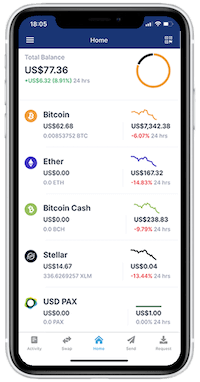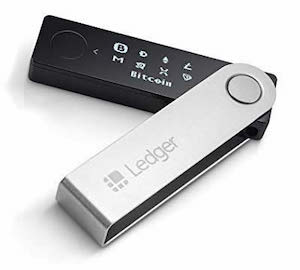In this section, we look at the different types of bitcoin wallets. Learn the strengths and weaknesses of each type of wallet and the purposes each wallet type is suitable for.
Before we touch on the wallets, it is important to first understand the concept of public and private keys in the context of cryptocurrencies, which we covered in the previous section.
Types of Bitcoin Wallets
There are basically 4 types of bitcoin wallets, and each type features different characteristics, strengths and weaknesses, and ease of use.
- Paper Wallets
- Paper bitcoin wallets are by far the simplest and most basic in form. A private key (or its corresponding QR code) can be printed down on a piece of paper and kept somewhere safe from prying eyes.
- Paper wallets are safe as they are stored offline and cannot be accessed remotely by hackers and malicious parties.
- However, users run the risk of losing or misplacing the paper, which would result in the complete loss of the wallet and funds.
- Other risks associated with paper wallets include degradation of the printing ink and illegibility if written out by hand.
- Paper wallets are also relatively more difficult to use than the other types, as many more steps are involved in order to spend the bitcoin in paper wallets.
- Paper wallets are useful as long-term storage of bitcoin i.e. not for daily spending, or for bitcoin kept as part of a will to be handed down to the next generation. In such cases, paper wallets can be stored in a safe deposit box at a bank.
- Paper wallets are considered a form of cold wallet as the private keys are stored offline. See Cold Wallets below.
- Exchange Wallets
- Exchange wallets are wallet facilities provided by an online cryptocurrency exchange platform which hold the bitcoin purchased by the account holder.
- Exchange wallets are generally considered the least safe place of the four types here as exchanges are centralised facilities with a concentrated collection of cryptocurrencies and have been known to be a target of hackers numerous times in the past.
- Wallets at exchanges are also known as custodial wallets as the exchanges manage the private keys and have full control over any cryptocurrency stored in these wallets.
- Even though the security levels of online exchanges have improved over the years and they have begun using cold wallets (see Cold Wallets below) to store the bulk of their bitcoin holding, the main concern with keeping your bitcoin at an exchange is that the private key to your exchange wallet is owned and held by the exchange and not by you.
Remember: Not your keys, not your coins. - If an exchange should shut down overnight for whatever reasons, or if there is an inside job, your bitcoin in exchange wallets would be lost forever. Recourse actions to reclaim these stolen or lost bitcoin are usually difficult or impossible.
- Exchange wallets are useful for temporary storage of bitcoin, and are usually left at exchange platforms for the purpose of trading or to be transferred elsewhere shortly after purchase. It should never be for long-term storage of bitcoin.
- Hot Wallets
- Hot wallets are wallets that are installed on devices connected to the internet and are by far the most common type of wallet used by cryptocurrency users.
- Hot wallets are usually apps that run on smartphones and other digital devices, or they may be accessed via a browser on the computer. Smartphones and computers are connected to the internet over wifi or data connection when they are turned on, and hence the term “hot” to describe these types of wallets.
- Hot wallets are generally considered safe for use as the private keys are held by the wallet owner (as opposed to exchange wallets where the private keys are held by the exchange platforms).
- As such, this type of wallet is also known as user-custodial wallets.
- However, due to the constant connection to the internet, they are still susceptible to hacks although this is a minor issue.
In a similar fashion, email and online banking accounts are also susceptible to hack attempts but it is a minor concern to the individual (as long as appropriate security measures are adhered to) such that it is still usable in day-to-day activities. - Hot wallets make it easy and convenient to send and receive bitcoin on the go and to pay for daily goods and services.
 A hot wallet such as the Blockchain.com bitcoin wallet runs as an app on both iOS and Android smartphones and can be accessed via an internet browser such as Chrome and Safari.
A hot wallet such as the Blockchain.com bitcoin wallet runs as an app on both iOS and Android smartphones and can be accessed via an internet browser such as Chrome and Safari. - Cold Wallets
- Cold wallets are wallets that are not connected to the internet and run on special devices known as hardware wallets.
- Cold wallets, also a form of user-custodial wallet, store the private keys onboard and offline, and are the safest type of wallet for cryptocurrency users.
- Cold wallets need to be connected to the internet in order for bitcoin to be sent.
Email analogy: You need to be logged into your email account to send an email. - The private key remains safe even when the device is connected as it is never exposed and never leaves the hardware wallet.
- Cold wallets (or all the other wallet types above) do not need to be connected to the internet to receive bitcoin as long as the sender has been provided with the public key (or wallet address).
Email analogy: You don’t need to be logged into your email account to receive emails. - A cold or hardware wallet that is lost or damaged can be easily replaced with another one. As long as the private key is recorded somewhere safe during the initial setup of the wallet, the funds can be restored in the new hardware wallet.
Email analogy: If a smartphone is lost or damaged, it can be replaced with another smartphone and the emails can be restored after installing an email client app and logging in. - Cold wallets are the most suitable type of wallet for long-term storage of bitcoin and other cryptocurrencies.
- We look at cold wallet options in Section 2.7 Hardware Wallets.
 The Ledger Nano series of hardware wallets are a popular choice amongst users and can store many types of cryptocurrencies other than bitcoin.
The Ledger Nano series of hardware wallets are a popular choice amongst users and can store many types of cryptocurrencies other than bitcoin.
In the next section 2.3 Two-Factor Authentication, before we set up an actual bitcoin wallet, we will first learn how to keep our wallet more secure and protect it from unauthorised access by using an additional layer of security.

 World's No.1
World's No.1